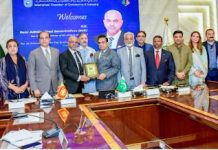ISLAMABAD, AUG 3 /DNA/ – The Pakistan Industrial and Traders Associations Front (PIAF) has sounded a warning that rapidly rising inflation—driven by escalating food and energy prices—is placing immense pressure on manufacturers, traders, and the broader economy. With inflation hitting high in July, the highest annual rate since December last year and representing a monthly increase of 2.9%, PIAF leadership says urgent measures are needed to cut production costs and preserve industrial competitiveness.
PIAF Chairman Faheemur Rehman Saigol expressed deep concern that inflation has risen sharply due to surging non-perishable food items and administratively increased gas and electricity charges, yet interest rates remain unadjusted at 11%, well above the inflation rate. He emphasized that this interest rate gap effectively benefits commercial banks at the expense of businesses and the federal government, which is burdened by nearly half of the yearly budget devoted to debt servicing.
The Chairman noted that while the inflation figure remains within the official forecast range of 3.5% to 4.5%, it masks the real pain being felt across shop floors and supply chains. He pointed to sugar prices, which have skyrocketed nearly 29.4% year-on-year and over 6% in the past month alone, despite official controls targeting ex-factory prices around Rs165 per kilogram. This stray pricing has pushed the market average to Rs179 per kg, with some sellers charging as high as Rs190 per kg.
Saigol highlighted that such runaway price increases—including a 20% rise in various pulses and substantial hikes in motor vehicle taxes (up 169%), gas (23%), and water supply (14%)—betray the vulnerability of small businesses and SMEs to inflation shocks. With the government’s fresh inflation projection target of 7.5% for the current fiscal year, he warned there is limited rationale left for high-interest rates to remain unchanged, which continue to elevate the cost of doing business.
Senior Vice Chairman Nasrullah Mughal echoed these concerns, warning that rising energy tariffs, inflation, currency volatility, and inflationary pressure from finance policies are combining to compress profit margins and drain liquidity. He pointed out that these circumstances serve as a direct threat to industrial recovery and export growth, particularly as policy inconsistencies and budget gaps in the recently approved federal budget fail to provide tangible relief.
Vice Chairman Tahir Manzoor Chaudhry added that production cost pressures are eroding Pakistan’s competitiveness in global markets. He underscored that without immediate steps to ease energy bills—electricity, gas, transportation—and cut red tape in compliance, manufacturers will struggle to remain viable. He urged the government to prioritize industrial financing relief, simplify operations for SMEs, and accelerate tax refunds to help manage cash flow.
The PIAF leadership jointly emphasized that the gap between inflation and policy rate is stifling the private sector. They cautioned that unless cost burdens are alleviated through targeted relief—in utility pricing, industrial credit access, and regulatory easing—the slow pace of production and stagnant trade will undermine economic stability.
Chairman Saigol explicitly urged authorities to consider reducing electricity and gas tariffs, linking utility bills to global fuel price movements, and to expedite adjustments across all energy-consuming industries. They called for phasing out inefficient oil-based power generation plants to favor cheaper base-load sources, thereby lowering input costs for industrial users.
Senior leadership warned that uncontrolled inflation, if unchecked, may cause a business shutdown wave and jeopardize domestic manufacturing capacities. They pressed the government to adopt policies that support value-added industries, simplify import procedures for crucial raw materials, and strengthen R&D support to help enterprises innovate and reduce dependence on imported inputs.
PIAF’s top team reminded policy-makers that high cost of doing business—stemming from inflation, high fuel and power charges, expensive credit, and unstable exchange rates—is the principal threat to both domestic growth and export resilience.

















